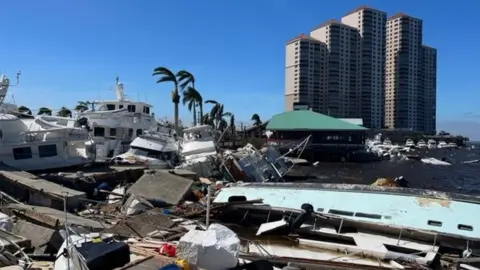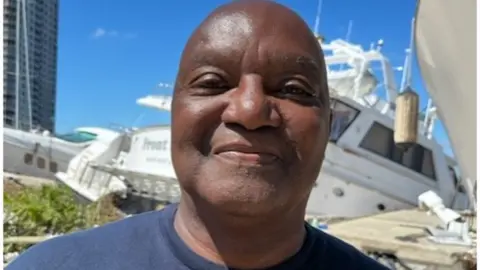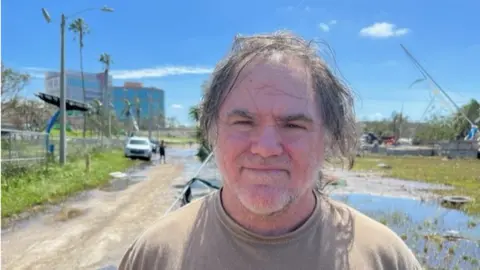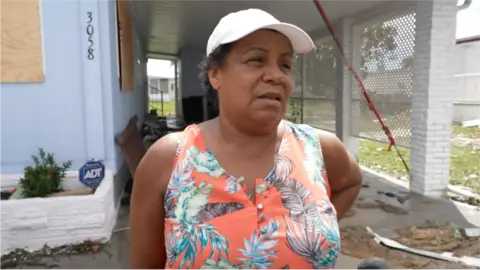Hurricane Ian devastates Fort Myers: 'The worst storm surge I've ever seen'
 BBC
BBCFort Myers was in the direct path of the hurricane as it came ashore and, less than 24 hours later, I'm standing with Pastor James Macon from the city's River Church, surveying the damage.
In the marina, boats are stacked on top of each other, bits of the floating harbour have been driven inland and everything is covered in mud and debris.
"I've never seen nothing like this in all my years in Florida. I've been here since 1982 and I'm lost for words right now," he tells me.
"This is, wow."
- LIVE: Follow updates here
- VISUAL GUIDE: Maps and images show destruction
Pastor James says he's been driving around looking for people in need of help and he's particularly worried about homeless people who might have been out last night.
But while he's aware that much of the damage here in the marina is likely to impact a different end of society, he says everyone needs help.

"This neighbourhood, of course, they're pretty well off, but we're here to help them out."
Lee county, the area that surrounds Fort Myers took the brunt of the storm surge.
There's been suggestions from the local sheriff, Carmine Marceno, that - in outlying island communities - particularly where they're hard to access as a result of at least one destroyed bridge and a damaged causeway - the authorities fear they could yet find significant loss of life.
But so far, there's been no official confirmation of that claim and, in a later interview, Mr Marceno was more cautious.
"I don't know the exact numbers, it's very preliminary," he told CNN.
The hurricane quickly lost power as it barrelled into the gulf side of the Florida peninsular and though heavy rain continued to pose a risk of flooding, the wind speed quickly dropped.
Fort Myers in particular though will be counting the cost for some time.
Patrick Hallquist was at home when the hurricane struck and says he's never seen anything this bad.

"I've been in quite a few hurricanes and this is the worst storm surge I've ever seen", he tells me. "It was a little bit anxiety ridden," he adds with understatement.
On the outskirts of Fort Myers we met Diole Ado, whose sons were helping clear up the shattered ruins of her home.
Diole moved to the mobile home community two years ago from New York and not only has she lost half of her property - the living room now exposed on all sides - she's lost her job too.
The greatest burden of adverse weather events is disproportionately borne by the most vulnerable.
"I clean houses," she told me. "Nobody is going to clean their houses now because their houses are a mess. It's too bad for me"
She'd been staying with her son when the hurricane struck, having been convinced by him to obey the warnings to move to safety.
"He said, 'Mum let's go, lets go. Don't stay here'," she said. She's lucky she did.

Despite the devastation, many here feel they've had a lucky escape from a hurricane that fits a pattern of increasingly powerful storms, thought to be fuelled in part by man-made global warming.
Pastor James says he's so far seen no evidence of a large number of casualties.
"I have a lot of friends around here, I've visited their houses and so far, so good," he tells me.
"By the grace of God we did endure this thing."
